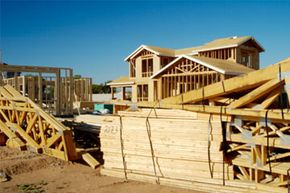Residential Construction
It was late in 2011, and my garage was looking, well, like a garage. Squirrels had eaten holes in the clapboard. The door jamb to the woodshop was rotted. The paint was awful. Finally, I'd had enough. I told my go-to contractors Jim and Francine that I wanted this sorry structure to have a makeover. Let's side it, I said, in barn-red clapboard.
The pair enthusiastically took the job. They did amazing work. Then I had a vision. I always have visions when it comes to home improvement. I'd wanted a small porch attached to the shop. (The shop is just a shop in name only, but let's just go with it.) I was low on cash, however. Then I had an idea. Jim's truck died the week before. I had an old 1993 Ford Ranger sitting in the driveway. It needed a new set of springs. I made a proposition: Build the porch and I'll sign over the truck. Jim and Francine finished the job in three days.
Advertisement
Jim and Francine are contractors, the backbone of the residential construction business. Contractors build and repair houses. Carpenters, plumbers, masons, electricians and others are all part of the residential construction trade [source: Allen and Thallon]. Some contractors won't do the work themselves. Instead, they'll hire subcontractors. That's because general contractors are the big idea people. They'll work with you from beginning to end. Subcontractors are specialists. Some are heavy equipment operators, others masons. They'll work until their particular task is finished.
Important parts of the residential industry are the builders and developers who hire the general contractors. Builders are people that coordinate a residential building project in the hopes of selling or renting the structure. A builder will buy the property and seek financing to fund the project. Builders hire the designers to sketch the project, and the contractors to put it all together. Builders can work on one property or multiple properties at the same time [source: Allen and Thallon].
Developers are builders on steroids. They'll buy large tracts and divide the property for sale as building lots. They'll make sure the roads and utilities are in place. Developers build private and public housing [source: Allen and Thallon].
The residential construct industry is an important part of the U.S. economy. The building industry as a whole suffered enormously during the Great Recession. Fortunately, in 2011, the industry added nearly 100,000 jobs. In February 2012, spending for private residential construction was $253 billion, nearly the same as January [source: U.S. Census Bureau].
I like to think I did my part to contribute to that figure. In fact, as I look out my garret again, I see the garage needs a roof. Let's make it hunter green, just like the new one on the house.
